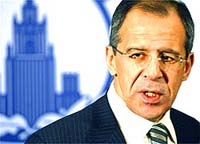Russia optimistic as foreign ministers discuss breaking deadlock over Iran nuclear program
A Russian diplomat said Thursday that Moscow remains optimistic the five veto-wielding members of the U.N. Security Council will break a deadlock on confronting Iran's nuclear program, as the nations' foreign ministers took up the issue in new efforts to reach a deal.

The comments by Russia's deputy U.N. ambassador, Konstantin Dolgov, were important because Russia and China have been key holdouts against a council statement proposed by Britain, France and the United States demanding Iran suspend uranium enrichment.
Moscow and Beijing are insisting that the U.N. nuclear watchdog in Vienna, the International Atomic Energy Agency, play the lead role in clearing up suspicions that Iran may be seeking a nuclear weapon, as the U.S. believes. Iran insists it is not.
"We think there is still an opportunity to get a compromise but a compromise that would send the rights signal endorse the IAEA, and help in the negotiation process which is going on and should go on," Dolgov told The Associated Press.
Dolgov described the negotiations as "difficult."
That fact was underscored by the announcement Thursday that foreign ministers of the five nations have gotten directly involved in negotiating the council statement.
U.S. Ambassador John Bolton said ministers were calling each other, but did not go into details. He suggested that for the time being, intensive discussions in New York had stopped.
"We're waiting for the outcome of conversations at higher pay grades," Bolton said.
A diplomat and a Western government official said U.S. Secretary of State Condoleezza Rice planned to talk with her Russian counterpart, Sergey Lavrov, on Thursday.
The two, demanding anonymity in exchange for discussing the state of play on Iran, said the talks between Rice and Lavrov would be followed by discussions drawing in the foreign ministers of China, France and Britain.
On Wednesday, Rice told reporters the talks could take more time, adding that she was optimistic diplomats would "come up with a vehicle" to address Iran.
Until now, the council has negotiated over the text of what's called a presidential statement, which would need consensus from the body's 15 members.
But Rice's comments suggested that the West might look for other options possibly a resolution, which would be put to an up-or-down vote in the council.
That would put Russia and China in the position of having to approve, abstain or veto action against Iran.
Dolgov said Russia was still under the assumption that the council was working toward a presidential statement, not a resolution.
"We are continuing negotiations in good faith and we hope that all our partners are doing likewise," Dolgov said, reports AP.
O.Ch.
Subscribe to Pravda.Ru Telegram channel, Facebook, RSS!





